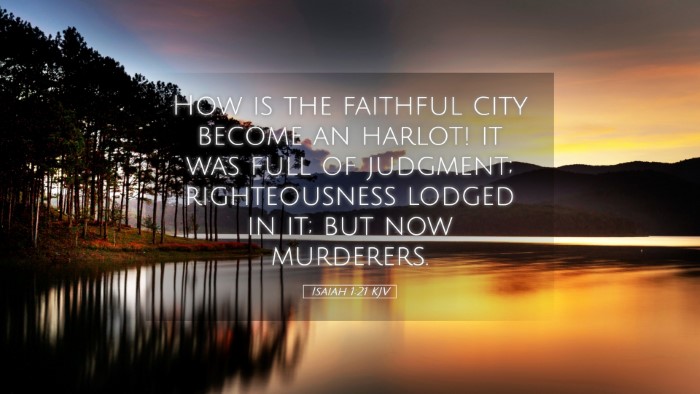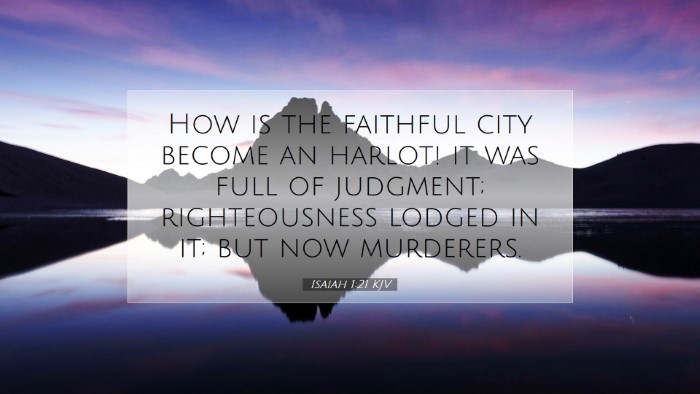Commentary on Isaiah 1:21
Isaiah 1:21 states: "How the faithful city has become a harlot! It was full of justice; righteousness lodged in it, but now murderers."
Contextual Overview
This verse emerges from a profound lamentation over Jerusalem, symbolizing both the holy city and the people of Israel. Here, Isaiah addresses the drastic moral deterioration that has afflicted the city once known for its justice and righteousness.
Insights from Matthew Henry
Matthew Henry describes this transformation as a tragic reversal of the city's character. He notes that Jerusalem, once a model of virtue, has fallen into vice, marked specifically by her unfaithfulness to God.
Henry elaborates that the term "harlot" signifies spiritual infidelity; the people have betrayed their covenant with God by pursuing idolatry and injustice. The justice that was once the hallmark of the city has been replaced with moral corruption and societal decay. This decay manifests not only in the idolatry condemned by Isaiah but also in the acts of violence that characterize their society.
Interpretations by Albert Barnes
Albert Barnes emphasizes the significance of the phrase "the faithful city." He points out that the use of "faithful" in the past tense indicates a lost reputation. This once faithful city has turned from its original purpose as a beacon of justice and righteousness.
Barnes notes that the term "harlot" reflects the unfaithfulness and the abandonment of their divine calling. He underscores the shift from justice to murderers, illustrating how political and social injustices often lead to moral and spiritual decay. The passage serves as a pointed indictment of a society that has forsaken its principles and succumbed to corruption.
Observations from Adam Clarke
Adam Clarke elaborates on the metaphorical implications of "harlot." He interprets this term as indicative of spiritual apostasy, demonstrating how the people have exchanged their loyalty to God for allegiances to foreign deities and immoral practices.
Clarke further highlights the stark contrast between the former glory of the city and its present shame. He emphasizes that this decline is not merely a social failing but a direct breach of the covenant relationship with God. The mention of "murderers" encompasses not only physical violence but also the betrayal of the spirit of the law that calls for justice and mercy.
Theological Implications
The profound implications of this verse stretch beyond its immediate context. For modern pastors and theologians, Isaiah 1:21 serves as a cautionary tale regarding the consequences of spiritual infidelity. The faithful must remain vigilant against the seduction of the world that can lead to moral compromise.
Scholars may consider the relationship between justice and righteousness as foundational to the community's health, both spiritually and socially. As the text suggests, a decline in these virtues can lead to severe consequences, both individually and corporately.
Application for Pastors and Theologians
Pastors may find in Isaiah 1:21 a powerful preaching point about the dangers of losing one's first love and neglecting the core values of the faith. The exhortation to uphold justice and righteousness becomes a central theme for the church today as it navigates a complex moral landscape.
Theologians might engage in deeper discussions about the nature of sin, society, and the concept of covenant faithfulness. The insights gained from this verse highlight the need for a collective return to foundational biblical values that call for justice, mercy, and faithfulness to God.
Conclusion
Isaiah 1:21 presents a sobering reflection on the decline of a once faithful people. Through the combined insights of esteemed commentators, it is evident that the spiritual and moral decay of Jerusalem serves as a poignant reminder of the dangers inherent in abandoning one's commitment to God. It poses critical questions for individuals and congregations regarding their own faithfulness and commitment to justice.


